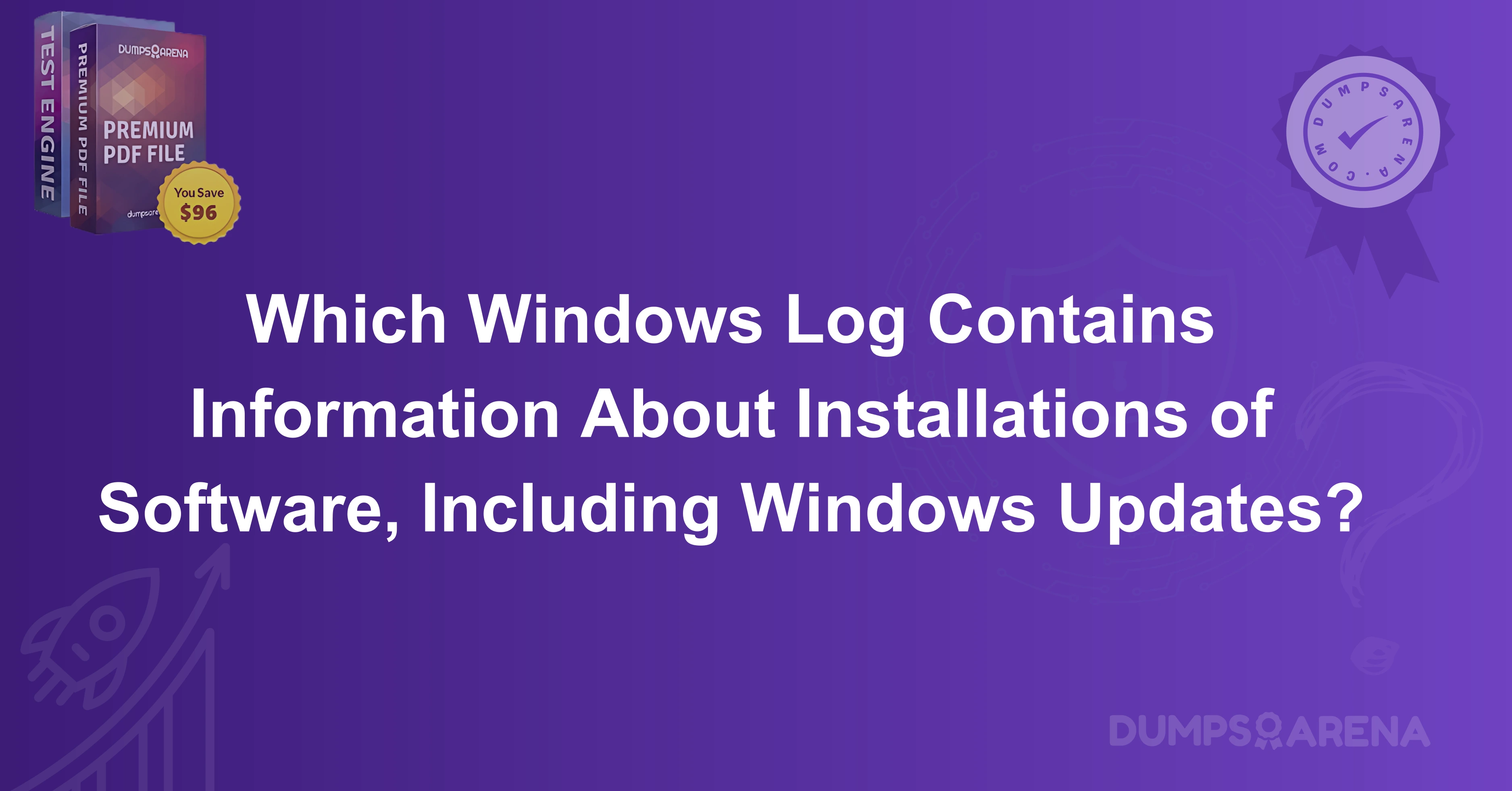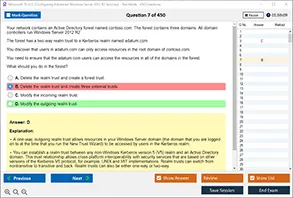Introduction
In today's digitally-driven world, the need to monitor system activities has never been more critical. Among the numerous responsibilities of IT professionals and system administrators is the management of software installations, including Windows updates. These updates often play a significant role in security, performance, and feature enhancements. But what if a system fails after a recent update or new software installation? Where do you turn for answers? That’s where Windows Logs come into play.
Windows Logs, particularly the Event Viewer, are indispensable tools for understanding and diagnosing system behavior. They provide detailed, time-stamped entries for every significant activity on the system, including software installations and updates. If you're looking for an answer to the question, "Which Windows log contains information about installations of software, including Windows updates?"—this comprehensive blog by DumpsArena will walk you through everything you need to know, and more.
Understanding Windows Event Viewer
Before diving into the specific log file, it's essential to understand what Windows Event Viewer is and how it operates. The Event Viewer is a built-in Windows utility that maintains logs of system, security, and application-level events. It helps users and administrators track down errors, security breaches, and even day-to-day operations.
When any activity occurs on a system—such as an update, installation, login attempt, or application crash—the Event Viewer stores this activity in categorized logs. Each log has its own set of event IDs, source programs, and detailed data that paint a picture of what has transpired on the computer.
The Key Log: Windows Setup Log (and Others)
To specifically monitor software installations and Windows updates, the most relevant log is the Windows Setup Log, also known as the Setup.evtx file. This log can be accessed through the Event Viewer under the following path:
Event Viewer > Applications and Services Logs > Microsoft > Windows > SetupThis log provides detailed information about the installation of the Windows operating system and updates. It includes each stage of the installation, any errors encountered, and successful completion messages.
However, the Setup Log is not the only log that contains relevant information. Depending on the context of the installation, several other logs may provide valuable insights:
-
Application Log
-
Captures events logged by applications or programs. It’s especially useful for third-party software installations.
-
-
System Log
-
Contains logs related to system components such as drivers, built-in system services, and Windows Updates.
-
-
Windows Update Log (WindowsUpdate.log)
-
This log has evolved with newer versions of Windows. In Windows 10 and later, this log must be generated using PowerShell via the command:
Get-WindowsUpdateLog -
It provides a readable format of the Windows Update engine’s activities.
-
-
CBS Log (Component-Based Servicing)
-
Located in
C:\Windows\Logs\CBS\CBS.log, this log provides in-depth information about updates, components, and Windows features.
-
How to Access the Setup.evtx Log
Here is a step-by-step guide to accessing the Setup log through the Event Viewer:
-
Press
Win + R, typeeventvwr.msc, and press Enter. -
Navigate to
Applications and Services Logs > Microsoft > Windows > Setup. -
Click on the ‘Operational’ log under ‘Setup’.
-
You will now see a list of events related to installation and setup.
Each log entry contains the following details:
-
Date and Time
-
Event ID
-
Task Category
-
Level (Information, Warning, Error)
-
Source
-
Description
Why Monitoring Installation Logs Is Crucial
System administrators, IT auditors, and cybersecurity professionals frequently rely on these logs to:
-
Troubleshoot failed installations
-
Ensure compliance with software policies
-
Analyze the sequence of system changes
-
Detect unauthorized software deployments
-
Confirm Windows Update patches
In enterprise environments, monitoring software installation logs is part of an organization’s larger endpoint management and security protocol. For instance, during software deployment via SCCM or Windows Update for Business, these logs confirm the status and success/failure of each operation.
Real-World Scenario: Diagnosing a Failed Windows Update
Let’s consider an organization where a routine Windows update causes critical software to malfunction. Instead of resorting to guesswork, the IT team checks the Event Viewer and navigates to the Setup.evtx log. Here, they find:
-
A timestamp of the update
-
The update package ID
-
An error code indicating a compatibility issue
Using this information, the team rolls back the update and applies a compatible version, effectively minimizing downtime and operational disruption. This scenario demonstrates the indispensable nature of proper log analysis.
Common Event IDs in Setup.evtx
Understanding Event IDs helps quickly identify the nature of each entry. Some common IDs include:
-
Event ID 1: Installation started
-
Event ID 2: Installation completed successfully
-
Event ID 3: Installation failed
-
Event ID 4: Update rollback initiated
Each of these entries comes with descriptions that often contain relevant error codes and file names, which can be cross-referenced with Microsoft's documentation or DumpsArena's knowledge base for more information.
Integration with System Monitoring Tools
In modern IT environments, logs from Event Viewer can be integrated with SIEM (Security Information and Event Management) systems like Splunk, Microsoft Sentinel, or ELK Stack. This integration enables:
-
Automated alerts for failed updates
-
Dashboards for monitoring update trends
-
Compliance reporting
These integrations are particularly important in regulated industries such as healthcare and finance, where tracking every system change is a legal requirement.
How DumpsArena Can Help
At DumpsArena, we recognize that understanding system behavior, including update and installation logs, is a critical skill for IT professionals. That’s why our certification prep materials, practice exams, and study guides often emphasize real-world application scenarios such as log analysis.
Whether you're preparing for Microsoft certifications, CompTIA exams, or cybersecurity assessments, knowledge of Windows logs can set you apart. Our curated dumps and guides are designed to simulate real administrative tasks, including reading and interpreting logs from the Event Viewer.
Conclusion
Understanding which Windows log contains software installation and update information is a cornerstone skill for IT professionals. The Setup.evtx log, along with related logs such as CBS, System, and Application, provides a wealth of data crucial for troubleshooting, auditing, and maintaining system integrity.
At DumpsArena, we aim to empower IT learners and professionals with the tools and knowledge they need to excel. Whether it's mastering logs or acing certification exams, our platform offers trusted resources tailored to real-world IT challenges. Let us help you transform your knowledge into certification success.
1.Which Windows log contains information about software installations, including Windows updates?
A) Application Log
B) Setup Log
C) Security Log
D) System Log
2.What is the primary function of the Setup log in Windows?
A) Track hardware failures
B) Monitor software installations
C) Log security-related events
D) Record user login attempts
3.Which event is typically recorded in the Windows Update log?
A) User authentication failures
B) Software installation successes and failures
C) System shutdown events
D) Network access attempts
4.Where can you find detailed information about Windows updates and installation history?
A) Control Panel
B) Windows Event Viewer
C) Task Scheduler
D) Microsoft Store
5.In which section of the Event Viewer would you check for Windows Update installation logs?
A) Applications and Services Logs
B) Windows Logs > Setup
C) Custom Views > Administrative Events
D) Security Logs
6.Which Windows log is most useful for troubleshooting Windows update issues?
A) Application Log
B) Setup Log
C) Security Log
D) System Log
7.What type of events are recorded under the Windows Setup log during software installation?
A) Hardware configuration changes
B) System crashes
C) Installation status of programs and updates
D) Network connectivity issues
8.How can administrators access the Setup log to review installation activities in Windows?
A) Through the Settings app
B) Via the Control Panel
C) By using the Event Viewer
D) Through the Command Prompt
9.What information does the Windows Setup log provide about installation failures?
A) File corruption details
B) Error codes and descriptions
C) User account details
D) Network status
10.Which of the following is NOT typically recorded in the Windows Setup log?
A) Installation of updates
B) Successful application launches
C) Installation of new software
D) Hardware configuration changes
Visit DumpsArena for the latest Microsoft AZ-104 Exam Dumps, study guides, and practice tests to help you achieve certification success! Explore our comprehensive resources designed to enhance your preparation for mastering Windows administration and updates.



